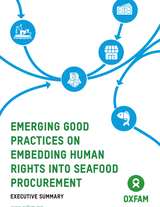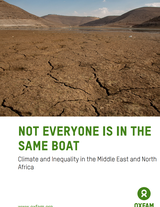Briefs
Search briefs
-
Briefing paper
Emerging Good Practices on Embedding Human Rights into Seafood Procurement
As seafood demand rises, it has been accompanied by a growing understanding of persistent human rights abuses. Recent reports have highlighted how poor procurement practices can contribute to abuses, while stronger practices can reduce them. This report reviews the current landscape and how buyers are enhancing their procurement practices to align with their human rights commitments. It provides examples in areas such as embedding human rights personnel within procurement teams, sustainable costing in price negotiations and preferential sourcing from suppliers that respect human rights. The briefing sets out actions for businesses to ensure alignment of procurement and human rights commitments.

-
Briefing paper
Not Everyone is in the Same Boat; Climate and Inequality in the Middle East and North Africa
The Middle East and North Africa is one of the regions that will be affected the most by climate change, extreme weather events, exacerbating the chronic water scarcity that it suffers from and current dependency on fossil fuels. Climate change impacts are already witnessed in many countries, especially those experiencing conflicts. At the same time the decades-long austerity policies in the region are not only fueling inequalities but also make it virtually impossible for the countries in the region to spend on climate.
The climate threats driven by the richest people, corporations, and rentier economies are existential to the region. Meanwhile, people living in poverty, marginalized communities vulnerable to climate change and those living in conflict-settings are the ones impacted the hardest. Women and girls, refugees and other groups experiencing discrimination, are particularly at disadvantage to current austerity policies and the consequences of climate change. The consequences are felt in all parts of the region and by most people, yet only the richest people have the wealth and the power and influence to adapt from the consequences of climate breakdown. Austerity policies are exacerbating the climate crisis, and the only way to address the climate breakdown is through taxing the wealthy and their polluting consumptions and massively invest in public services and climate mitigation, adaptation and transition.

-
Briefing paper
Brief: After Trump Administration's 90-Day U.S. Foreign Aid Review, the Human Toll is Immeasurable and Will Grow Exponentially
On January 20, President Trump signed an Executive Order that began the assault on U.S. foreign aid and led to the illegal dismantling of USAID. After a 90-day review, the human toll is immeasurable and will grow exponentially.

-
Briefing paper
Sudan crisis, two years on
Two years into Sudan’s brutal war, the humanitarian catastrophe has engulfed the entire country, spilled over across the region, and shows no signs of abating. Thousands continue to be killed, starved and raped as violence forces millions to leave their homes throughout Sudan and across borders.
Since breaking out in Khartoum in April 2023, the armed conflict quickly spread and escalated into the world’s gravest humanitarian crisis. All key indicators turned scarlet over the course of the past 24 months:
• Highest number of People in Need ever recorded : For the first time in the history of modern humanitarian response, a single country reaches over 30 million people in need of humanitarian assistance. That’s 3 in every 5 people living in Sudan.
• Highest number of internally displaced in the world with up to 9 million people forcibly displaced inside Sudan. Combined with over 3.7 million refugees and returnees in neighboring countries, nearly 13 million people have fled violence in the past 2 years, making it one of the largest displacement crises post-World War II.
• Highest number of people in emergency or catastrophic levels of hunger, with over 600,000 people living in famine, and 8 million others on the cliff edge.
-
Briefing paper
Cuts to the Internal Revenue Service are a Gift to Billionaire Tax Cheats
Some of the very wealthiest people already fail to pay what they legally owe in taxes to the tune of over $200 billion a year. As part of an effort to further rig the tax code for corporations and billionaires, President Trump and Elon Musk have proposed cuts to the Internal Revenue Service (IRS) that would allow rich tax cheats to steal an additional $110 billion from the public over the next decade. That’s $30 million more in stolen tax revenue every single day.

-
Briefing paper
Water-Driven Hunger: How the Climate Crisis Fuels Africa's Food Emergency
This briefing paper examines the interconnected water and food crises in Eastern and Southern Africa, focusing on eight of the continent’s most water-insecure countries. The focus countries are hunger hotspot countries for 2025 according to the FAO and WFP. The report shows that to address food security, water security is fundamental.
The report demonstrates the importance of adopting an integrated approach that tackles water and food insecurities, emphasizing the importance of equitable access to resources and improved coordination between sectors such as water, sanitation, and hygiene (WASH), food security and nutrition. It also points out the challenges of localizing climate models, securing funding for adaptation, and responding to loss and damage.
The brief was developed using a combination of desk reviews and key informant interviews conducted at the country level to gather comprehensive insights.



